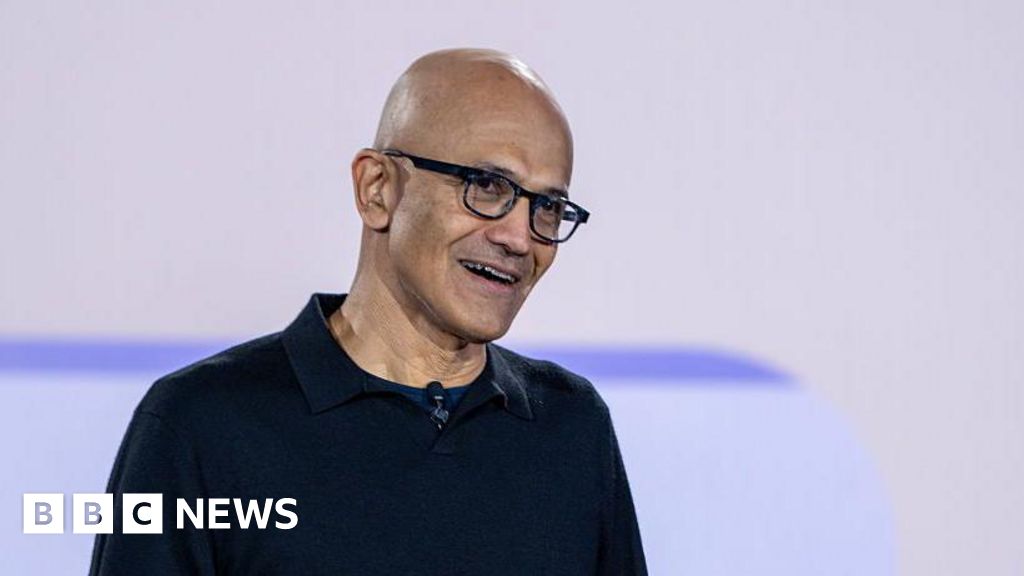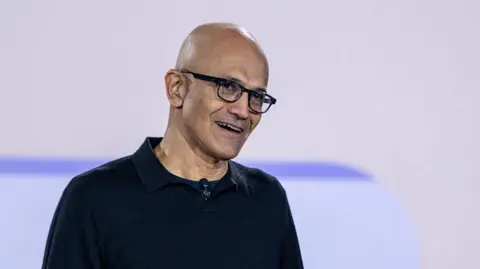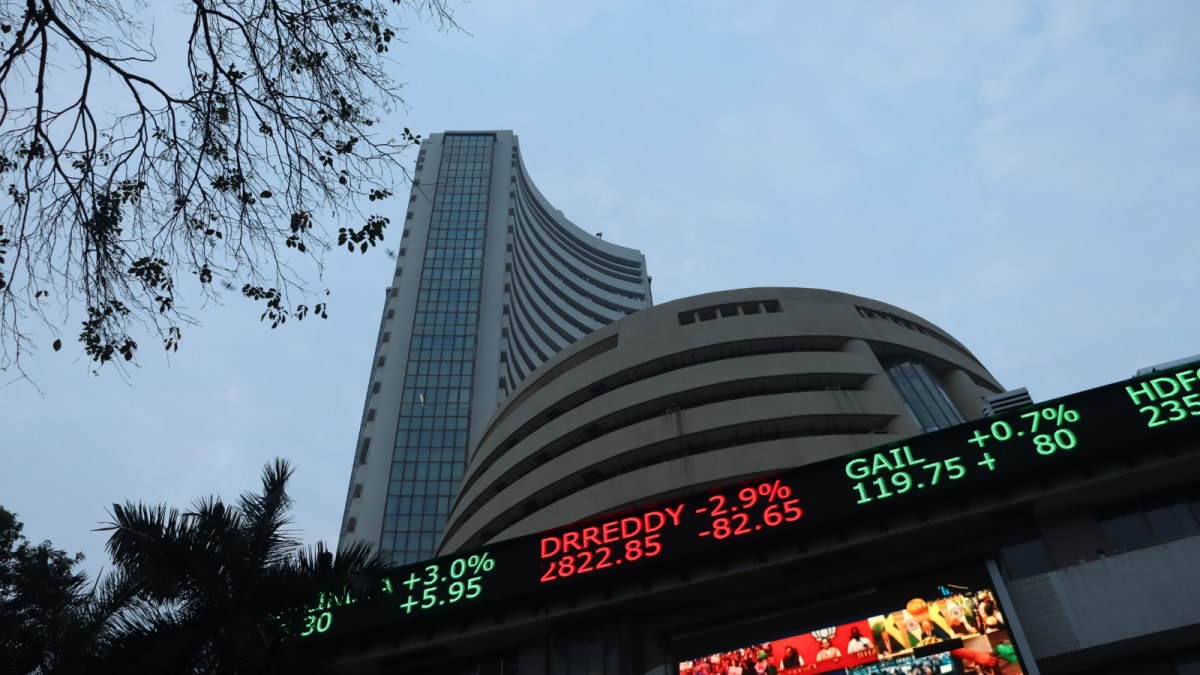Business
AI could boost UK economy by 10% in 5 years, says Microsoft boss

Zoe KleinmanTechnology editor
 Getty Images
Getty ImagesMicrosoft says its new $30bn (£22bn) investment in the UK’s AI sector – its largest outside of the US – should significantly boost Britain’s economy in the next few years.
The package forms a major part of a £31bn agreement made between the UK government and various other US tech giants, including Nvidia and Google, to invest in British-based infrastructure to support AI technology, largely in the form of data centres.
Microsoft will also now be involved in the creation of a powerful new supercomputer in Loughton, Essex.
Speaking exclusively to the BBC Microsoft CEO Satya Nadella told the BBC of the tech’s potential impact on economic growth.”
“It may happen faster, so our hope is not ten years but maybe five”.
“Whenever anyone gets excited about AI, I want to see it ultimately in the economic growth and the GDP growth.”
Prime Minister Sir Keir Starmer said the US-UK deal marked “a generational step change in our relationship with the US”.
He added that the agreement was “creating highly skilled jobs, putting more money in people’s pockets and ensuring this partnership benefits every corner of the United Kingdom.”
The UK economy has remained stubbornly sluggish in recent months.
Nadella compared the economic benefits of the meteoric rise of AI with the impact of the personal computer when it became common in the workplace, about ten years after it first started scaling in the 1990s.
But there are also growing mutterings that AI is a very lucrative bubble that is about to burst. Nadella conceded that “all tech things are about booms and busts and bubbles” and warned that AI should not be over-hyped or under-hyped but also said the newborn tech would still bring about new products, new systems and new infrastructure.
He acknowledged that its energy consumption remains “very high” but argued that its potential benefits, especially in the fields of healthcare, public services, and business productivity, were worthwhile. He added that investing in data centres was “effectively” also investing in modernising the power grid but did not say that money would be shared directly with the UK’s power supplier, the National Grid.
The campaign group Foxglove has warned that the UK could end up “footing the bill for the colossal amounts of power the giants need”.
The supercomputer, to be built in Loughton, Essex, was already announced by the government in January, but Microsoft has now come on board to the project.
Big tech comes to town
Mr Nadella, revealed the investment as Donald Trump has arrived in the UK on a three-day state visit.
The UK and US have signed a “Tech Prosperity Deal” as part of the visit, with an aim of strengthening ties on AI, quantum computing and nuclear power.
Google has promised £5bn for AI research and infrastructure over the next two years.
Nvidia also pledged to develop AI in the UK, which will help fuel innovation, economic growth and jobs, a spokesperson for the chip giant told the BBC.
The company said that along with its partners it will invest up to £11bn in the UK, in what it called the largest AI infrastructure rollout in the country’s history.
UK Chancellor Rachel Reeves also opened a £735m data centre as part of the investment on Tuesday in Hertfordshire.
There are some concerns that accepting so much money from US investors will mean the UK relies too much on foreign technology.
In July, Trump made clear his intentions were for the US to win global the AI race.
One of the ways it stated it would do this was to “export American AI to allies and partners.”
The UK government has signed number of deals with US technology companies, including an agreement to use OpenAI services in the public sector and a £400m contract to use Google Cloud services in the Ministry of Defence.
Satya Nadella said he thought the agreement defined “the next phase of globalisation” and argued that having access to foreign tech services leveraged digital sovereignty rather than threatened it.
On the growing issue of AI taking over jobs, Nadella said Microsoft also had to “change with the changes in technology”, having laid off thousands of staff this year despite record sales and profits. He described it as “the hard process of renewal”.
AI growth zone in north-east England
The government also said there was “potential for more than 5,000 jobs and billions in private investment” in north-east England, which has been designated as a new “AI growth zone“.
Last year, the government announced a £10bn investment into a data centre to be built near Blyth, Northumberland.
It has now announced another data centre project dubbed Stargate UK from OpenAI, chipmaker Nvidia, semiconductor company Arm and Nscale.
That will be based at Cobalt Park in Northumberland.
OpenAI boss Sam Altman said Stargate UK would “help accelerate scientific breakthroughs, improve productivity, and drive economic growth.”
However the UK version is a fraction of the firm’s US-based Stargate project, which OpenAI launched in January with a commitment to invest $500 billion over the next four years building new AI infrastructure for itself.
So far, reaction to the agreement has been broadly positive, but it is clear that there are many challenges ahead for the UK if it is to fulfil its intended potential.
The Tony Blair Institute described the news as a “breakthrough moment” but added that Britain had some work to do: “reforming planning rules, accelerating the delivery of clean energy projects, and building the necessary digital infrastructure for powering the country’s tech-enabled growth agenda,” said Dr Keegan McBride, the Tony Blair Institute for Global Change’s emerging tech and geopolitics expert.
Matthew Sinclair, UK director of the Computer & Communications Industry Association, hailed the agreement as “a powerful demonstration of the scale of the AI opportunity for the UK economy.”
But the Conservative Party highlighted that other big international companies such as the pharmaceutical giant Merck have recently cancelled or delayed their UK expansion plans.
Satya Nadella spoke to the BBC News in between board meetings, shortly before jumping on a flight to join Donald Trump as he arrives in the UK on a three-day state visit. Nadella will be among other tech leaders, including OpenAI’s Sam Altman and Nvidia’s Jensen Huang, attending the Royal state banquet on Wednesday.
He said he would use Microsoft’s AI tool Copilot to help him decide what to wear.
“I was very surprised that there was a very different dress protocol, which I’m really not sure that I’m ready for,” he said.

Business
Investors suffer a big blow, Bitcoin price suddenly drops – SUCH TV

After the drop in gold price, Bitcoin price also fell.
Bitcoin fell below $77,000 in the global market, Bitcoin price fell by more than 13% in a week.
Bitcoin’s highest price in 6 months fell below $126,000, Bitcoin price has dropped by more than $49,000.
Business
Post-Budget Session: Bulls Push Sensex Up By Over 900 Points, Nifty Reclaims 25,000

Last Updated:
The BSE Sensex is trading higher by 371 points, or 0.47%, at 81,090.24, while the NSE Nifty rises by 70 points to trade above 24,850 at 24,889.25.

Stock Market Today.
Market Updates Today: A day after the market crash following the Budget’s provision to hike Securities Transaction Tax (STT), the domestic equity market on Monday saw heightened volatility. After opening nearly flat, the NSE Nifty rose to the day’s high, then touched the day’s low before sharply recovering to trade at the day’s high of 25,093.
As of 3:16 pm, the BSE Sensex surged by 932 points, or up 1.13%, to 81,641.87 in the afternoon trade and the NSE Nifty rose by 267 points, or up 1.07%, to trade above 25,000 at 25,093.27. After opening nearly flat, the NSE Nifty rose to the day’s high, then touched the day’s low before sharply recovering to trade at the day’s high of 25,093.27.
Among the 30 Sensex shares, 25 stocks were trading in the green. Among the top gainers were PowerGrid, Adani Ports, BEL, Reliance, Mahindra & Mahindra, Larsen & Toubro, and IndiGo, rising by up to 7.91%. The laggards were Axis Bank, Infosys, Titan, TCS, and Trent, falling by up to 1.97%.
After opening nearly flat, at around 9:30 am, the BSE Sensex jumped by 350 points to 81,112.03 in the opening trade, while the NSE Nifty rose 91 points to trade above the 24,900 level at 24,910.85. However, the benchmarks gave up all gains and declined to day’s low amid heavy volatility.
Aakash Shah, technical research analyst at Choice Equity Broking Private Ltd, said, “Near-term sentiment remains cautious despite some support from domestic technical indicators. The broader market direction will largely be influenced by global equity cues, crude oil price movements, and institutional fund flows.”
On Sunday, the Nifty saw an aggressive sell-off after the Budget 2026 announcement to hike STT, plunging nearly 870 points from 25,440 to an intraday low of 24,571, before staging a partial recovery to close at 24,825.
“A strong bearish candle was formed, with the index closing decisively below the 200-day EMA, indicating a deterioration in trend strength. Immediate resistance is placed at 24,950–25,000, while key support lies in the 24,650-24,700 zone. The RSI slipped to 31, reflecting oversold conditions, while India VIX surged 10.73% to 15.09, highlighting elevated market volatility,” Shah said.
On Sunday, February 1, foreign institutional investors (FIIs) sold equities worth Rs 588 crore, while domestic institutional investors (DIIs) also remained net sellers, offloading shares worth Rs 682 crore, adding to the pressure on the market.
V K Vijayakumar, chief investment strategist at Geojit Investments Ltd, said, “Yesterday’s market selloff resulting in 495 point crash in Nifty was a knee-jerk reaction to the sharp increase in STT on F&O trades. This was not a revenue-raising measure, but a decision to discourage retail traders from complex F&O trading, in which 92% of them were losing money. This decision is in the interest of retail investors. But this decision impacted the market sentiments, which were already impacted by the decision to make no changes in the LTCGs tax, which a section of the market was expecting rather unrealistically.”
It is important to understand that the Budget is a growth-oriented Budget with fiscal prudence. The 10% nominal GDP growth projected in the Budget is achievable and has the potential to deliver around 15% earnings growth in FY27. The market will soon start discounting this positive. But it is possible that FIIs may continue to sell impacting the market. Retail investors should keep their cool and remain invested and continue to invest systematically. A significant upturn in the market may take time; perhaps a retreat from AI trade globally. We don’t know when this will happen. But we know that an earnings rebound is imminent in response to this growth oriented Budget. That is a clear positive, he added.
February 02, 2026, 09:34 IST
Read More
Business
Gold prices fall sharply locally and internationally – SUCH TV

Gold prices have fallen significantly in both local and international markets, with 10 grams now priced at Rs18,433 and a tola at Rs21,500.
The price per tola fell below Rs22,000, reaching Rs21,500, while 10 grams dropped to Rs18,433.
Internationally, gold also saw a decline, with prices falling by 215 dollars to 4,676 dollars per ounce.
-

 Sports6 days ago
Sports6 days agoPSL 11: Local players’ category renewals unveiled ahead of auction
-

 Entertainment6 days ago
Entertainment6 days agoClaire Danes reveals how she reacted to pregnancy at 44
-

 Business6 days ago
Business6 days agoBanking services disrupted as bank employees go on nationwide strike demanding five-day work week
-

 Tech1 week ago
Tech1 week agoICE Asks Companies About ‘Ad Tech and Big Data’ Tools It Could Use in Investigations
-

 Fashion1 week ago
Fashion1 week agoSpain’s apparel imports up 7.10% in Jan-Oct as sourcing realigns
-

 Sports6 days ago
Sports6 days agoCollege football’s top 100 games of the 2025 season
-

 Politics1 week ago
Politics1 week agoFresh protests after man shot dead in Minneapolis operation
-

 Politics6 days ago
Politics6 days agoTrump vows to ‘de-escalate’ after Minneapolis shootings







